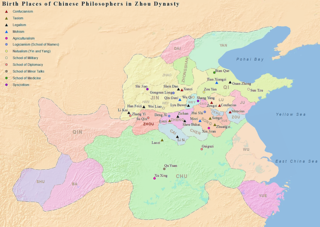
Mohism or Moism was an ancient Chinese philosophy of logic, rational thought and science developed by the academic scholars who studied under the ancient Chinese philosopher Mozi and embodied in an eponymous book: the Mozi. It evolved at about the same time as Confucianism, Taoism and Legalism, and was one of the four main philosophic schools from around 770–221 BC. During that time, Mohism was seen as a major rival to Confucianism. Although its influence endured, Mohism all but disappeared as an independent school of thought.
Quantum key distribution (QKD) is a secure communication method which implements a cryptographic protocol involving components of quantum mechanics. It enables two parties to produce a shared random secret key known only to them, which can then be used to encrypt and decrypt messages. It is often incorrectly called quantum cryptography, as it is the best-known example of a quantum cryptographic task.
The Logicians or School of Names was a school of Chinese philosophy that grew out of Mohism during the Warring States period in 479–221 BCE. It is also sometimes called the School of Forms and Names. Deng Xi has been named its founder.

The Hundred Schools of Thought were philosophies and schools that flourished from the 6th century to 221 B.C. during the Spring and Autumn period and the Warring States period of ancient China.

Jiuquan Satellite Launch Center is a Chinese space vehicle launch facility (spaceport) located in the Gobi desert, Inner Mongolia. It is part of the Dongfeng Aerospace City. Although the facility is geographically located within Ejin Banner of Inner Mongolia's Alxa League, it is named after the nearest city, Jiuquan in Gansu Province.

The BeiDou Navigation Satellite System (BDS) is a Chinese satellite navigation system. It consists of two separate satellite constellations. The first BeiDou system, officially called the BeiDou Satellite Navigation Experimental System and also known as BeiDou-1, consists of three satellites which since 2000 has offered limited coverage and navigation services, mainly for users in China and neighboring regions. Beidou-1 was decommissioned at the end of 2012.

Tiān (天) is one of the oldest Chinese terms for heaven and a key concept in Chinese mythology, philosophy, and religion. During the Shang dynasty, the Chinese referred to their supreme god as Shàngdì or Dì (帝,"Lord"). During the following Zhou dynasty, Tiān became synonymous with this figure. Heaven worship was, before the 20th century, an orthodox state religion of China.

Lu Ban was a Chinese carpenter, engineer and inventor during the Zhou Dynasty. He is revered as the Chinese god (patron) of builders and contractors.
Quantum networks form an important element of quantum computing and quantum communication systems. Quantum networks facilitate the transmission of information in the form of quantum bits, also called qubits, between physically separated quantum processors. A quantum processor is a small quantum computer being able to perform quantum logic gates on a certain number of qubits. Quantum networks work in a similar way to classical networks. The main difference, as will be detailed more in later paragraphs, is that quantum networking like quantum computing is better at solving certain problems, such as modeling quantum systems.

Sun Yirang was a Qing dynasty Chinese philologist. A native of Wenzhou, Zhejiang province, he retired from official employment early in his life to devote himself to scholarship. His most important works are Mozi Jiangu (墨子間詁), a corrected, definitive edition of Mozi, and Zhouli Zhengyi (周禮正義), an important commentary on the Rites of Zhou. He also contributed to the studies of the bronzeware script and oracle script. His work Qiwen Juli (契文舉例), published posthumously by Luo Zhenyu, was the first work of decipherment of the oracle bone script.

Quantum technology is an emerging field of physics and engineering, which is about creating practical applications -- such as quantum computing, quantum sensors, quantum cryptography, quantum simulation, quantum metrology and quantum imaging -- based on properties of quantum mechanics, especially quantum entanglement, quantum superposition and quantum tunnelling.
Mohist consequentialism, also known as state consequentialism, is a consequentialist ethical theory which evaluates the moral worth of an action based on how it contributes to the basic goods of a state, through social order, material wealth, and population growth. According to the Stanford Encyclopedia of Philosophy, Mohist consequentialism, dating back to the 5th century BC, is the "world's earliest form of consequentialism, a remarkably sophisticated version based on a plurality of intrinsic goods taken as constitutive of human welfare". The term state consequentialism has also been applied to the political philosophy of the Confucian philosopher Xunzi.
Fa is a concept in Chinese philosophy that covers ethics, logic, and law. It can be translated as "law" in some contexts, but more often as "model" or "standard." First gaining importance in the Mohist school of thought, the concept was principally elaborated in Legalism. In Han Fei's philosophy, the king is the sole source of fa (law), taught to the common people so that there would be a harmonious society free of chance occurrences, disorder, and "appeal to privilege". High officials were not to be held above fa, nor were they to be allowed to independently create their own fa, uniting both executive fiat and rule of law.
Pan Jianwei is a Chinese quantum physicist known for his work in the field of quantum entanglement. He has been called the "father of quantum", and was named as one of Nature's 10 in 2017. He is an academician of the Chinese Academy of Sciences and The World Academy of Sciences, and serves as Vice President of the University of Science and Technology of China.
Quantum Experiments at Space Scale, is an international research project in the field of quantum physics.
Nirvana in Fire 2 is a 2017 Chinese television series starring Huang Xiaoming, Liu Haoran, Tong Liya and Zhang Huiwen. It is the sequel to Nirvana in Fire, which is based on Hai Yan's novel with the same name. It tells the stories that take place after the events of the original series, which revolves around the Langya Hall. The series aired on Dragon TV and Beijing TV from December 18, 2017 to February 12, 2018.
Events from the year 1848 in China.








